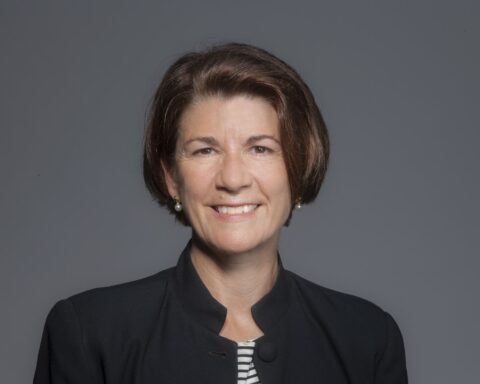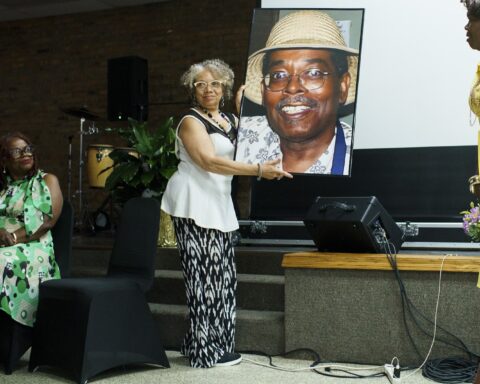Those decisions entail having apprenticeships or internships that can grow future leaders in local policymaking roles; equitable access to opportunities on the project for marginalized populations; creating generational wealth; expanding economic opportunity and scaling that for small businesses. Community involvement is at the forefront, Malone said.
A visit to the Bronzeville Lakefront website shows stakeholders in the project have committed to a diverse workforce at every stage of the project. A digital museum, welcome center and business accelerator, coupled with smart buildings with green designs, are all on the to-do list. Bronzeville Lakefront is expected to create 76,000 jobs and have an economic impact of $8.2 billion.
Equipped with a degree in women’s studies from Old Dominion University in Virginia, Malone arrived in Chicagoland in 2015 after a meaningful stint at the Kettering Foundation in Ohio under the tutelage of former CEO Forrest David Mathews. Malone may credit her career-military parents with teaching her to think bigger and wider in her public service, but Malone said it’s Mathews who changed the trajectory of her life. The former U.S. secretary of health, education and welfare during the administration of President Gerald Ford showed her what participatory and deliberative democracy looked like. She met people from all over the world as a summer research assistant at the foundation in 2013.
“I really didn’t know what it meant to be civic outside of voting,” she recalled. “I knew about community service, but I didn’t know that there was a whole group of people out there thinking about how to empower citizens; (Kettering Foundation) was the first stop. Their main mantra is that government should subsidize citizen-led initiatives, where if you are actually being representative, you are following the will of the people in a meaningful way and investing in citizen-led initiatives versus telling people what they need.”
Malone came to Chicago with that knowledge and worked with organizations like AFSCME Council 31 as an organizer and Teamwork Englewood as a program manager for the 15-year Englewood Quality of Life Plan, which involved hundreds of residents, five task forces and public-private partnerships.
“I got involved in Englewood because a county commissioner was proposing that we should give free homes in Black and brown communities to first responders, even though they don’t want to live here. And they’ve told you that,” Malone said. “So you’re giving free homes, just renovated, that just are investment properties for these folks. What about the people who are currently working in government, or nonprofit, or education, that can’t afford to get a home or currently are on their third or fourth refinance? Why would you just give away free homes to people who don’t want to be here versus investing in people who are sustaining it and do want to be here, and proving it, and been here a while? That’s what keeps me up at night. Making sure that the people who are currently here get a chance to enjoy whatever we build.”
Then came a stint with the Chicago Department of Aviation as a policy analyst. Malone said her knowledge of systems, operations and people and her passion for workforce and policy landed her the position. The knowledge she acquired in this role is helping her at Farpoint.
“If you know airports, you know the entire city, because for every city department, there’s an airport division,” Malone said. “So if you can learn airports, you can learn anything in the city.”
As Malone juggles her Farpoint work, she also serves on the Cook County Commission on Social Innovation; is lead steward of the Black Chicago Jobs Board; and sits on a number of boards, including the Chicago Coalition for the Homeless. At 29, she’s racked up accolades in the process, having recently won the Ariel Investments and WVON 1690-AM 40 Gamechangers Under 40 award last month.
Malone, a North Virginia transplant and an only child, has been cited as the “glue” that holds together the Bronzeville Lakefront project, according to Regina Stilp, a founding principal of Farpoint Development.
“Morgan is so talented in so many ways, but she is truly someone who understands,” said Paula Robinson, president of Bronzeville Community Development Partnership, a proponent of Bronzeville who has been doing work around the Bronzeville Metropolis National Heritage Area and making Bronzeville a nationally designated historical site. Malone considers her a team member on the lakefront venture. Robinson said Malone sharing her knowledge of environmental, social and governance sustainability on the lakefront project shows that organizations like hers need to learn from Malone.
Malone came to the Chicago area to be around her father’s family, based in Joliet, but she also knew that an urban landscape was where she could do meaningful work. When she joined Farpoint, she told the principals she could only do equitable and inclusive development, otherwise the job wasn’t a go. They didn’t hesitate, she said.
“I believe in open source. How can I learn as much as I can to tell my community what’s actually going on behind closed doors and strengthen their advocacy? So I got into this work because I didn’t understand it and I wanted to. I know that I add value. I know that I’m smart. And I know that I try. And I’m going to make an effort to figure things out.”
Malone knows that Bronzeville residents are wondering, “How are we going to be able to preserve the best of who we are and who we’ve been with the upcoming development? How do we not make this a situation where now the Bronzeville Lakefront reflects no trace that anyone Black was ever there?” While she understands why people distrust developers, she sees development as a pathway to build with purpose and create change that positively affects those most impacted. That’s why she’s an advocate in every room that she enters.
“I’m not going to be able to move the needle on everything with everyone, but I’m usually able to pinpoint a thing that I can get someone to wrap their mind around. And if I can get you to do one thing and you to do one thing, I got an ecosystem where everyone’s doing something, and I can pull the pieces that I need,” Malone said.
In creating the Bronzeville Lakefront, Malone wants to have honest conversations. So when she thinks about Bronzeville in 20 years, her hope is that the people who built the community are still living there. She’s hopeful that the project will be a model for others.
“If you can do it in Chicago, you can do it anywhere,” she said.




